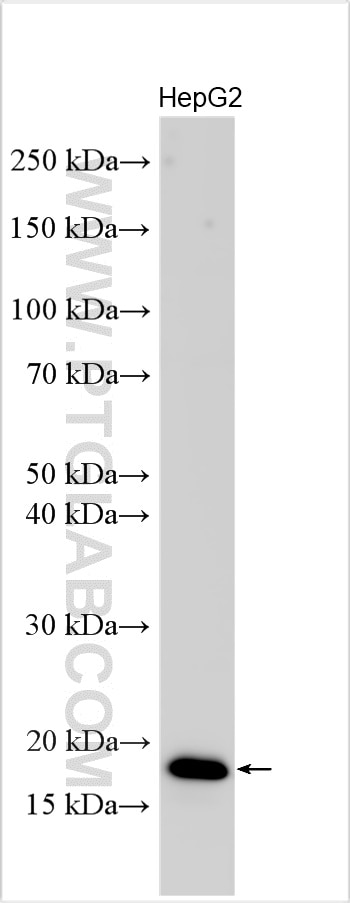EIF4EBP2 Polyklonaler Antikörper
EIF4EBP2 Polyklonal Antikörper für WB, ELISA
Wirt / Isotyp
Kaninchen / IgG
Getestete Reaktivität
human, Maus, Ratte
Anwendung
WB, ELISA
Konjugation
Unkonjugiert
Kat-Nr. : 15628-1-AP
Synonyme
Geprüfte Anwendungen
| Erfolgreiche Detektion in WB | HepG2-Zellen |
Empfohlene Verdünnung
| Anwendung | Verdünnung |
|---|---|
| Western Blot (WB) | WB : 1:1000-1:4000 |
| It is recommended that this reagent should be titrated in each testing system to obtain optimal results. | |
| Sample-dependent, check data in validation data gallery | |
Produktinformation
15628-1-AP bindet in WB, ELISA EIF4EBP2 und zeigt Reaktivität mit human, Maus, Ratten
| Getestete Reaktivität | human, Maus, Ratte |
| Wirt / Isotyp | Kaninchen / IgG |
| Klonalität | Polyklonal |
| Typ | Antikörper |
| Immunogen | EIF4EBP2 fusion protein Ag8101 |
| Vollständiger Name | eukaryotic translation initiation factor 4E binding protein 2 |
| Berechnetes Molekulargewicht | 120 aa, 13 kDa |
| Beobachtetes Molekulargewicht | 15-20 kDa |
| GenBank-Zugangsnummer | BC005057 |
| Gene symbol | EIF4EBP2 |
| Gene ID (NCBI) | 1979 |
| Konjugation | Unkonjugiert |
| Form | Liquid |
| Reinigungsmethode | Antigen-Affinitätsreinigung |
| Lagerungspuffer | PBS with 0.02% sodium azide and 50% glycerol |
| Lagerungsbedingungen | Bei -20°C lagern. Nach dem Versand ein Jahr lang stabil Aliquotieren ist bei -20oC Lagerung nicht notwendig. 20ul Größen enthalten 0,1% BSA. |
Hintergrundinformationen
EIF4EBP2(Eukaryotic translation initiation factor 4E-binding protein 2), also named as 4EBP2, is a member of the eukaryotic translation initiation factor 4E binding protein family. EIF4EBP2 is enriched in brain and acts as a regulator of synapse activity and neuronal stem cell renewal via its ability to repress translation initiation. EIF4EBP2 is a repressor of translation initiation involved in synaptic plasticity, learning and memory formation (PubMed:30765518).
Protokolle
| PRODUKTSPEZIFISCHE PROTOKOLLE | |
|---|---|
| WB protocol for EIF4EBP2 antibody 15628-1-AP | Protokoll herunterladen |
| STANDARD-PROTOKOLLE | |
|---|---|
| Klicken Sie hier, um unsere Standardprotokolle anzuzeigen |


